Soccer Dreams from Bamako
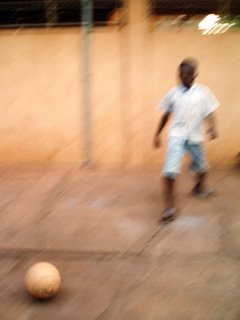
Way back in June, I received a packing list from my Mali program director. Somewhere between “mosquito netting” and “toilet paper,” I read “small gifts for children.” I had no idea what exactly a Malian child would want or need and so I posed the question back to my director.
“Soccer equipment,” Michelle replied without hesitation, “Anything, new or used: shoes, socks, shin guards, jerseys, balls, etc.”
I sent out a quick e-mail to my hometown soccer association and was amazed with the response. A large plastic bin was set outside our front door for collection and within a couple weeks, enough gear had been donated to fill a large suitcase and three boxes. The latter would be sent via Fed-Ex and arrive at some undetermined time.
I’m not sure if I can fully stress how soccer, or le football, is engrained into Malian society. It is so omnipresent that after a while, the sounds of soccer matches becomes background neighborhood noise…like chickens squawking and imams calling for prayer from the local mosques. Now that I’m suddenly thrust back into American life, I’m realizing how much I miss it.
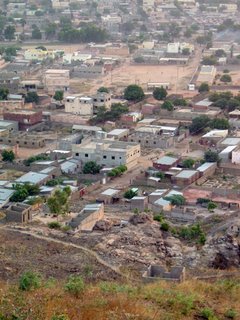
Soccer fields are everywhere in Mali, though not in the formal delineated versions that we are used to here in the US. Any grass that once existed either wilted under the harsh sun or got eaten by the herds of roaming goats. A soccer net would consist of two vertical poles and sidelines were invisible to my eyes but inherently known to the players. Equipment was minimal and it was more common than not to see players running around on the uneven pebbly ground with bare feet. Anything could be converted into a soccer field—side alleys, school yards, farm fields—because only the basics were needed, players and a ball. There’s something very special about watching a late-afternoon pick-up game when the dust gets stirred up by running feet and is illuminated by the setting sun.
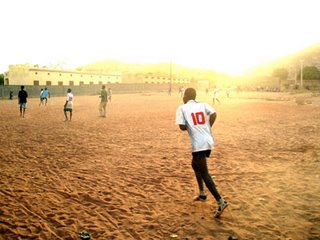
When I arrived at my host family in Guarantiguibougou, a southern Bamako district, I discovered that my two Malian brothers, Ton Ton (8) and Chiek (10) were playing soccer with a deflated basketball. It did nothing to diminish their enthusiasm and knack for mischief (hitting parent’s cars is apparently culturally universal). But imagine their excitement when I unpacked a real soccer ball and various articles of gear. Our courtyard became the new center for neighborhood soccer games and for the next few days, all I heard were the sounds of bouncing balls and running feet.
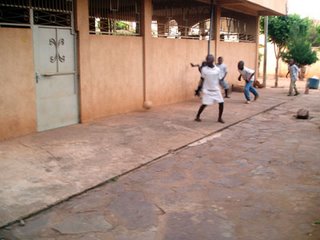
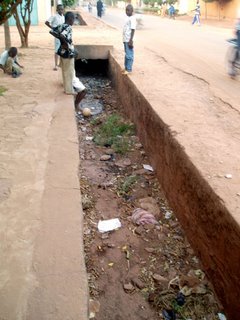
When it got too dark to play soccer, everyone gathered around a small TV in the family courtyards to watch any of the international soccer cups being broadcast. All the men in the neighborhood could be found outside their houses, thirty people seated in low chairs and stools surrounding a 12” TV that cast its blue light across their faces. You could always tell when the Malian soccer team scored because the neighborhood would start cheering and cars would honk their horns. And this isn’t even for any major final competition; this was every game. And if we ever lost, well, let’s just say it’s expected to find tear gas at the ensuing riots.
Even when we were backpacking in Dogon, perhaps one of the most remote places I’ve ever been, we would watch soccer matches on TV’s connected to car batteries that had been charged by solar panels all day. The screens were usually black and white and fuzzy and I could never determine who was actually playing. We wondered if these European sports stars knew their fans were watching from tiny villages near the Saharan desert.
Anytime we traveled to the cyber-café, market, or downtown Bamako, we would pass a large dusty red soccer field. During the afternoon, it was rare to find any players simply because it was too hot. As soon as the sun began its descent and school/work got out, the field became alive with numerous teams competing on any of the makeshift fields. Weekends brought more official competitions between neighborhood teams and I once sat in on one where a marching band, circa-colonial France 1900, and a traditional dance troupe opened the event. Various mayors and government officials were introduced and we sat in the row behind them because, as foreigners, we were always distinguished guests.
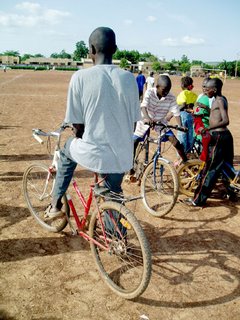
So I arrived in Mali with a piece of luggage full of soccer equipment, as did my classmates India and Jake. Rather than just distribute the gear immediately to our neighborhood kids—oh the chaos that would have ensued!—we decided to wait a bit to get a feel for what would be culturally appropriate. And of course, we wanted to wait for the three Fed-Ex boxes.
After a couple of weeks, we met Ma Coulibaly, the matriarch of our Malian in-laws. The Coulibaly clan, as we liked to call them, lived not far from our house in Djoumanzana and is quite possibly, one of the nicest families I’ve ever met. The Malian society is structured around the family unit and it’s common to see four generations living under one large roof. No one goes hungry because meals are prepared en masse and shared amongst the family members. Ma Coulibaly is the type of woman that I want my kids to live with from age 4-8, someone who can lay down the law with the strictest kind of love possible. Plus, she speaks beautiful French. Anyway, she heads up one of the local woman’s association and is well connected within the government. She volunteered to organize some sort-of ceremony for the Djoumanzana soccer team to receive our gear, something official and fair. We decided to hold off until the last boxes arrived.
Fast forward to the last week in Mali and the boxes still haven’t arrived. A quick lesson in the Mali postal service; it doesn’t exist. I never saw a single mailman or mailbox. I found one post office in Bamako and it’s a cavernous building with sleepy clerks that closes from 12ish to 3ish each afternoon. I did receive a couple letters during my semester. They always appeared randomly, some boy dropping them off at our front door, passed through who knows how many hands. The postmark was always from a month earlier. So obviously, I held little hope for these last boxes. My professor was wise when she brought 18 extra pieces of luggage on her Air France flight; sure it was a bit more expensive, but at least it was guaranteed to arrive with you.
With just a few days until our plane departed, we decided to pass out the soccer gear that we had brought with us, still a significant amount. We hid everything in Jake’s huge duffel bag and carried it (and our favorite neighbor girl) to the Coulibaly house. Ma received us warmly and we went around to the various family members, greeting them with “I ni wu la, i ka kene.” Because very few things are actually planned in Mali, we spent a half hour playing with the children as Ma and her sisters finished preparing dinner. The local soccer team was “called” (a Coulibaly child was sent to fetch them) and we inflated balls while we waited. (If these pictures appear blurry, it’s because I passed on the camera to a six year-old). I don’t know if the soccer players knew the reasons why they were being called, but I’m sure rumor of these foreigners and their mystery bag had spread quickly through the neighborhood. Under the watchful eye of Ma Coulibaly, they approached our piles of shoes, jerseys, gloves, balls, and shin guards (something they have probably never used before). I smiled to myself as I saw little boys hold up green Grosse Pointe soccer uniforms that were too large for their bodies; did they know where Grosse Pointe was? Did it even matter?
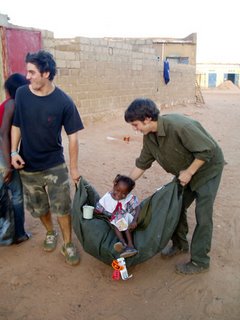
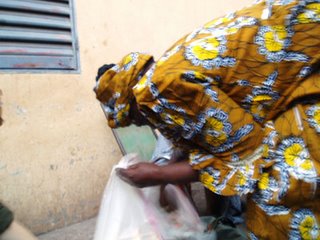
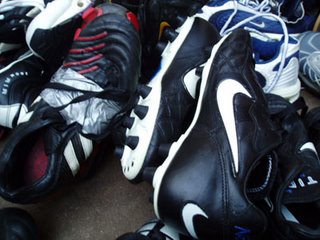
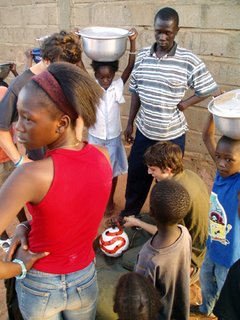
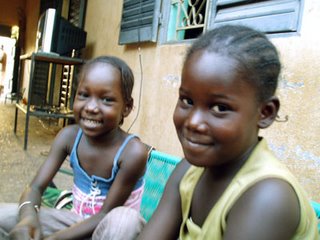

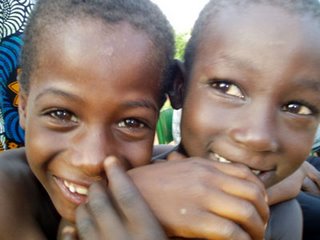
I’m not sure we’ll ever know the true impacts of these donations. These children live and breathe soccer and dream of one day playing in Europe. From what we’ve seen, the talent is there, but a barefoot player with a deflated basketball just has a much more difficult chance than a fully outfitted one. So perhaps the cleats that we passed out brought one boy a step closer to that dream. I’ll never really know. But just the possibility of that happening is enough for me.
Update: The week that I returned home, my mom received box “1 of 3,” returned from Mali. Maybe the other two have somehow made their way to our house in Djoumanzana. Or maybe they’ll arrive next week in Grosse Pointe. (If they do, we’ll pass them along to next year’s students.) Three months ago, that may have frustrated me, but now I just sigh nostalgically and think, That’s Mali…
THANK YOU TO EVERYONE WHO DONATED!!

4 Comments:
Michael -
Thanks for sharing the photos! We donated the Tony the Tiger ball and my kids enjoyed so much seeing it a world away....
Welcome Home and Merry Christmas!!!
Mary Weber-Smith
11:03 PM
I travelled to Nicaragua on a study abroad, and the prof leading the trip organized a clothing-and-other-necessities-drive. Then each student filled a moving box with clothing, toys and other things to for families and communities. As long as it's under 50 lbs. [or whatever the limit is], and with careful application of packing tape, you can check it as a second peice of luggage. ... Although you may have had two bags, I suppose. Anywho... just a thought for your prof for future trips?
P.S. This is Greg O's girlfriend Kate. I've really enjoyed reading as your experience unfolded. Sorry if that's a little creepy.
6:00 PM
I definitely am experiencing the reverse culture shock... I'm honestly not even at a point where I'm particularly thrilled to be back in the US...although the dismal weather may be a big reason for that.
I'm not sure how time is moving for me, but I certainly still don't have a grasp on what day of the week it is or the fact that classes will be starting in 3 days...I think the start of classes will definitely shock me back into the reality of my life here. Let me know when you're around so we can get together and chat...I really can't wait to hear about everything you've done...virgin islands included :) I've been hodling out on the tea drinking since my return, and I think this would be the perfect occasion to start it back up...
4:09 PM
loved this. and so happy to see ma, djibi, and some other coulibaly's in your photos. i lived with them for 5 months in '01, and have been back once to visit. can't say enough great things about them. feel free to hit me up on my blog - soungalo.blogspot.com
peace.
i ni che kosebe!
7:41 PM
Post a Comment
Subscribe to Post Comments [Atom]
<< Home